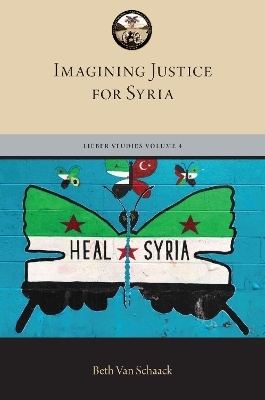
Imagining Justice for Syria
Oxford University Press Inc (Verlag)
978-0-19-005596-7 (ISBN)
This book situates the war in Syria within the actual and imagined system of international criminal justice. It explores the legal impediments and diplomatic challenges that have led to the fatal trinity affecting Syria: the massive commission of international crimes that are subject to detailed investigations and documentation but whose perpetrators have enjoyed virtually complete impunity. Given this tragic state of affairs, the book tracks a number of accountability solutions being explored within multilateral initiatives and by civil society actors, including innovations of institutional design; the renewed utility of a range of domestic jurisdictional principles (including the revival of universal jurisdiction in Europe); the emergence of creative investigative and documentation techniques, technologies, and organizations; and the rejection of state consent as a precondition for the exercise of jurisdiction.
Engaging both law and policy around international justice, the text offers a set of justice blueprints, within and without the International Criminal Court. It also considers the utility, propriety, and practicality of pursuing a transitional justice program without a genuine political transition. All told, the book attempts to capture results of the creative energy radiating from members of the international community intent on advancing the accountability norm in Syria even in the face of geopolitical blockages within the U.N. Security Council. In so doing, it presents the range of juridical measures-both criminal and civil - that would be available to the international community to respond to the crisis, if only the political will existed.
Beth Van Schaack is the Leah Kaplan Visiting Professor in Human Rights at Stanford Law School where she teaches in the areas of international human rights, international criminal law, and human trafficking, and directs the Human Rights & Conflict Resolution Clinic. Prior to returning to academia, she served as Deputy to the Ambassador-at-Large for War Crimes Issues in the Office of Global Criminal Justice of the U.S. Department of State under Secretaries Clinton and Kerry. In that capacity, she helped formulate U.S. policy regarding the prevention of and accountability for mass atrocities, such as war crimes, crimes against humanity, and genocide, and worked extensively on the Syrian crisis. Prior to entering the academy, she was with the Office of the Prosecutor of the International Criminal Tribunal for the former Yugoslavia in The Hague. A graduate of Stanford University and Yale Law School,
Dedication
Abbreviations
Forward & Acknowledgements
Chapter 1. Introduction
Chapter 2. A Short History of a Long Conflict: From Revolution to Atrocity
Chapter 3. The Security Council and International Crimes in Syria: A Study in Dysfunction
Chapter 4. Deconstructing the Would-Be ICC Referral: The Politics of International Justice in the Security Council
Chapter 5. Prospects for Justice before the International Criminal Court
Chapter 6. A Menu of Models for Accountability: Options for an Ad Hoc Tribunal for Syria
Chapter 7. National Courts Step Up: Syrian Cases Proceeding in Domestic Courts
Chapter 8. Civil Suits: The Utility of State Responsibility and the Law of Tort
Chapter 9. Innovations in International Criminal Law Documentation Methodologies and Institutions
Chapter 10. Transitional Justice Without Transition: The International Community's Efforts in Syria
Chapter 11. Conclusion
| Erscheinungsdatum | 30.09.2020 |
|---|---|
| Reihe/Serie | The Lieber Studies Series |
| Verlagsort | New York |
| Sprache | englisch |
| Maße | 239 x 163 mm |
| Gewicht | 975 g |
| Themenwelt | Recht / Steuern ► EU / Internationales Recht |
| Recht / Steuern ► Öffentliches Recht ► Völkerrecht | |
| Sozialwissenschaften ► Politik / Verwaltung ► Europäische / Internationale Politik | |
| ISBN-10 | 0-19-005596-0 / 0190055960 |
| ISBN-13 | 978-0-19-005596-7 / 9780190055967 |
| Zustand | Neuware |
| Haben Sie eine Frage zum Produkt? |
aus dem Bereich


